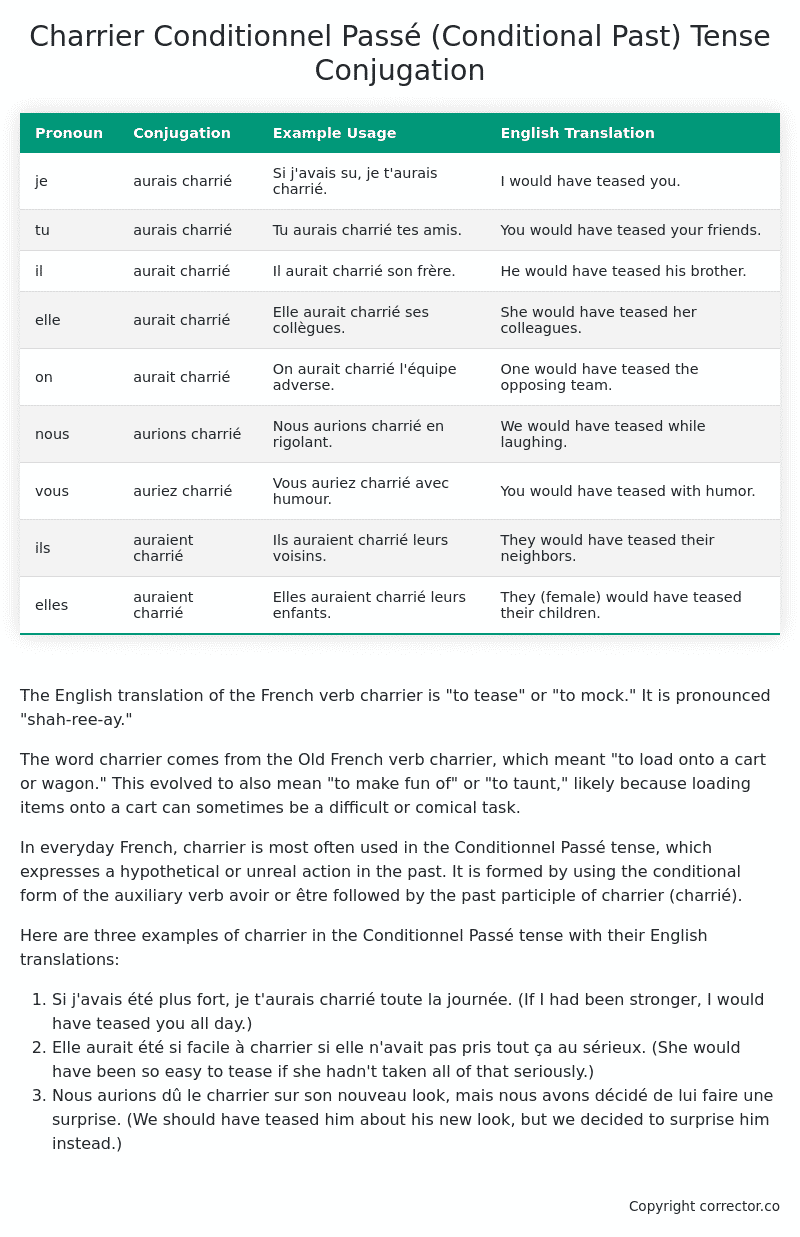Conditionnel Passé (Conditional Past) Tense Conjugation of the French Verb charrier
Introduction to the verb charrier
The English translation of the French verb charrier is “to tease” or “to mock.” It is pronounced “shah-ree-ay.”
The word charrier comes from the Old French verb charrier, which meant “to load onto a cart or wagon.” This evolved to also mean “to make fun of” or “to taunt,” likely because loading items onto a cart can sometimes be a difficult or comical task.
In everyday French, charrier is most often used in the Conditionnel Passé tense, which expresses a hypothetical or unreal action in the past. It is formed by using the conditional form of the auxiliary verb avoir or être followed by the past participle of charrier (charrié).
Here are three examples of charrier in the Conditionnel Passé tense with their English translations:
- Si j’avais été plus fort, je t’aurais charrié toute la journée.
(If I had been stronger, I would have teased you all day.) - Elle aurait été si facile à charrier si elle n’avait pas pris tout ça au sérieux.
(She would have been so easy to tease if she hadn’t taken all of that seriously.) - Nous aurions dû le charrier sur son nouveau look, mais nous avons décidé de lui faire une surprise.
(We should have teased him about his new look, but we decided to surprise him instead.)
Table of the Conditionnel Passé (Conditional Past) Tense Conjugation of charrier
| Pronoun | Conjugation | Example Usage | English Translation |
|---|---|---|---|
| je | aurais charrié | Si j’avais su, je t’aurais charrié. | I would have teased you. |
| tu | aurais charrié | Tu aurais charrié tes amis. | You would have teased your friends. |
| il | aurait charrié | Il aurait charrié son frère. | He would have teased his brother. |
| elle | aurait charrié | Elle aurait charrié ses collègues. | She would have teased her colleagues. |
| on | aurait charrié | On aurait charrié l’équipe adverse. | One would have teased the opposing team. |
| nous | aurions charrié | Nous aurions charrié en rigolant. | We would have teased while laughing. |
| vous | auriez charrié | Vous auriez charrié avec humour. | You would have teased with humor. |
| ils | auraient charrié | Ils auraient charrié leurs voisins. | They would have teased their neighbors. |
| elles | auraient charrié | Elles auraient charrié leurs enfants. | They (female) would have teased their children. |
Other Conjugations for Charrier.
Le Present (Present Tense) Conjugation of the French Verb charrier
Imparfait (Imperfect) Tense Conjugation of the French Verb charrier
Passé Simple (Simple Past) Tense Conjugation of the French Verb charrier
Passé Composé (Present Perfect) Tense Conjugation of the French Verb charrier
Futur Simple (Simple Future) Tense Conjugation of the French Verb charrier
Futur Proche (Near Future) Tense Conjugation of the French Verb charrier
Plus-que-parfait (Pluperfect) Tense Conjugation of the French Verb charrier
Passé Antérieur (Past Anterior) Tense Conjugation of the French Verb charrier
Futur Antérieur (Future Anterior) Tense Conjugation of the French Verb charrier
Subjonctif Présent (Subjunctive Present) Tense Conjugation of the French Verb charrier
Subjonctif Passé (Subjunctive Past) Tense Conjugation of the French Verb charrier
Subjonctif Imparfait (Subjunctive Imperfect) Tense Conjugation of the French Verb charrier
Subjonctif Plus-que-parfait (Subjunctive Pluperfect) Tense Conjugation of the French Verb charrier
Conditionnel Présent (Conditional Present) Tense Conjugation of the French Verb charrier
Conditionnel Passé (Conditional Past) Tense Conjugation of the French Verb charrier (this article)
L’impératif Présent (Imperative Present) Tense Conjugation of the French Verb charrier
L’infinitif Présent (Infinitive Present) Tense Conjugation of the French Verb charrier
Struggling with French verbs or the language in general? Why not use our free French Grammar Checker – no registration required!
Get a FREE Download Study Sheet of this Conjugation 🔥
Simply right click the image below, click “save image” and get your free reference for the charrier Conditionnel Passé tense conjugation!

Charrier – About the French Conditionnel Passé (Conditional Past) Tense
Formation
Common Everyday Usage Patterns
Expressing Unreal Past Scenarios
Polite Requests or Suggestions
Expressing Doubt or Uncertainty
Interactions with Other Tenses
Conditional Present
Indicative Past Tenses
Conditional Future
Summary
Want More?
I hope you enjoyed this article on the verb charrier. Still in a learning mood? Check out another TOTALLY random French verb conjugation!


